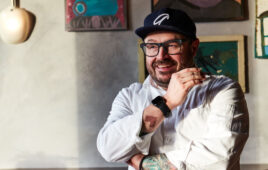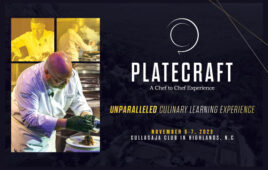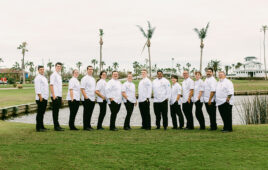
Today, the 4,000-member club remains well-known for the elegance and quality of its facilities—perhaps most particularly for its dining, now under the direction of Kevin Brennan, CEC, AAC. As the club’s Executive Chef since 1994, Chef Brennan has been heavily involved in the Michigan chapter of the American Culinary Federation, has won many culinary salon awards, and is a founding member of Michigan Chefs Against Hunger.
In coming to the DAC, Kevin was reunited with his long-time friend, Executive Manager Ted Gillary, to continue a notably successful working relationship that included seven years together at Orchard Lake (Mich.) Country Club and now stretches back 20 years in total. In our conversation, Chef Brennan provided valuable insights into how he and Ted have worked as a team to build what is now a thriving, $7 million-plus F&B operation.
Q Chef, I don’t have to tell you that many chefs would be envious—maybe even incredulous—of how you’ve worked so well and for so long with your Executive Manager. How have you two avoided the conflicts that impede so many chef-GM relationships?
A Ted and I actually first started working together at The Recess Club here in Detroit, 20 years ago. Early on, we both realized that we shared a common vision: Food is the cornerstone to success in a club operation. We still have that same vision today, and by combining it with an emphasis on integrity, strong leadership, team-building skills, and a focus that benchmarks our club against the best in the country, we have always had a mutual respect for each other—and an ability to actually enjoy our workdays together.
It also helps a lot that early in his career, Ted apprenticed here at the DAC, under Chef Dan Huglier, CMC. This certainly gave him a great appreciation from the start of what it takes to be successful in a food and beverage operation, and he has carried that through his advancement in the management ranks.
Q Since you were reunited at the DAC in 1994, the two of you have led vast improvements in overall member satisfaction with dining. What are some of the first things you focused on changing?
A It started with the food; we had a solid team in place that was eager to move forward with good cooking. I set goals to stay current and seasonal, the team jumped on board, and we haven’t looked back since. And while we’ve grown and changed significantly over the past 14 years, the “food first” philosophy has always remained the same.
Q How has this paid off?
A Our F&B revenues have increased from $2.5 million in 1994 to now over $7 million. We had great years from the mid- to late ‘90s, in line with a good economic situation for the country in general and Detroit in particular (this was the original heyday of SUVs and trucks). Also, we have been able to capitalize on Detroit being the host city for some great sports events, such as baseball’s All-Star Game and the NFL Super Bowl, as well as the Tigers competing in the 2006 World Series.
All of these created unbelievable opportunities in catering and special events—and as a management team, we have always made it a point to be tuned in to all upcoming business opportunities, operating on forecasts established with a 30/60/90-day report for our catering and weekly a la carte business. We react accordingly, establishing strong labor and cost controls as needed prior to the event itself. Bottom line, we are flexible enough to jump on opportunities, but structured enough to manage our budgeted goals.
Q Has it been difficult to maintain this structure, and quality, while having such significant growth?
A While we started with a passion for food, it’s had staying power because we also developed a systematic process for implementing our vision. The DAC kitchens follow the same methodology that other departments use throughout the organization, to assure that we consistently produce high-quality products and services. We call it the Consistent Performance Process, or CPP—it’s a process distinctive to DAC operations, and is worth an article in itself, just to describe and learn how it works.
In a nutshell, the key parts of CPP are 1) documenting our vision; 2) detailing what we must do 100% of the time to keep customers happy; 3) creating standards and procedures to execute parts one and two; 4) rigorous and ongoing training, which includes staff certification; 5) measuring results non-stop; and finally, 6) implementing action plans for continuous improvement.
The hard part is being relentless in following all steps with equal diligence. But it works to our advantage if we can do it.
Q In addition to special sports events, with your proximity to Comerica Park, Ford Field and the theater district, you also have a regular need to serve people who want to dine at the DAC as part of an outing to a game or show. How do you handle the crowds and timing demands this can create?
A It became evident right after I got here that our a la carte dining room would need to change to meet the demands of our membership, not only because of overall growth but also because of how many people would want to eat at the same time, around the kinds of events you’re talking about. We started the first phase of our clubhouse renovation in 1996, with a focus to improve our fine dining room and kitchen. We built a new a la carte kitchen that enables us to keep the integrity of our menu during peak service periods, in a dining room that can now seat 225 people comfortably per turn.
Since that renovation, keeping our clubhouse in prime condition has been the goal of both management and our members. In the last 12 years, we have spent more than $40 million in renovations to member areas of the club. Knowing that the physical capabilities of the building, and the kitchen equipment, would all be kept intact in this way has allowed my team to focus on menus and execution.
Here again, CPP comes into play, as a flexible process that is rooted in change. It is based on setting guarantees in each of our departments, and is the daily measure of our successes and failures. We are blessed to have a large culinary and stewarding staff, but CPP is vital to staying consistent.
Q Speaking of the economy, while Detroit and the auto industry benefited as much as any region or sector from the boom of the ‘90s, Michigan is now at the forefront of concerns with falloffs in growth and employment. How do you now factor this into your club operations?
A It has affected us, but not to the degree you would expect. As the new millennium began, we were blessed with a full membership and a waiting list. In the past few years, we have fallen below that coveted mark, but we are still optimistic about the future. This past year, even in these tougher financial times, we brought in a record number of members.
Our focus is now on retention, and we work to make it very hard for anyone to ever see a need to drop their membership. We strive to instill value in a DAC membership through our food, service, and athletic programs, while providing a unique place for our members to have unparalleled social and professional interactions.
Q Beyond the club business, there is also a special level of outside restaurant competition that comes with being a downtown location. How do you keep challenging yourself to stay current?
A Personally, I have a very competitive nature; it must come from being one of six children and having sports in my background. So it comes naturally for me to want to know what I’m up against.
And with food as the medium, it is very easy for me to challenge myself and my staff to keep moving ahead. We have a great staff that constantly keeps me refreshed with ideas for improving our menus and concepts. We have developed a communicative environment in our kitchens, and constantly benchmark our operation against the best in the country. We try to never stop learning, be it through professional development seminars or visits to competitors’ operations. I also insist on accurate and meaningful feedback from the members, management and staff of the DAC, and always listen carefully for areas where we may be able to improve recipes or execution.
As a club, we have long recognized the importance of making sure we’re always moving ahead. We have been voted one of the “Best & Brightest” places to work in the metropolitan Detroit area for the last eight years running. We have received an Achievement of Excellence award from the American Culinary Federation, were again rated as a Platinum Club of America, and remain one of the top two city/athletic clubs in the country, as rated by the Club Leaders Forum.
We are currently applying for the Michigan Quality Council Leadership award, based on Malcolm Baldridge criteria. The process of completing the application has led to still more improvements in how we run our business.
In the end, everything we do is focused on satisfying our members, and on doing our best to ensure that the DAC is prepared for another 100 years of success.




